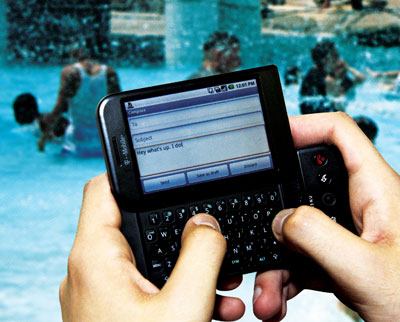What’s your policy on lifeguard cell phone use? Last summer, media outlets across the nation called attention to a potentially deadly practice: lifeguards texting while on duty.
With summer 2011 in full swing and “there’s an app for that” mentality becoming ever more pervasive, experts say it’s time for more pool operators to get serious when it comes to dealing with lifeguard cell phone use.
“It’s really starting to affect the industry more and more, just like in general society. But with us, it’s a little more dangerous,” said Chris Griffith, aquatic supervisor for the city of Paul’s Valley, Okla. Griffith also is moderator of the LifeguardLink group on AI Connect. “It’s starting to encroach on the safety of our patrons. …”
News reports last summer included everything from “hidden camera” investigations documenting the problem, to drowning lawsuits claiming the guard responsible for watching the victim was sending and receiving text messages instead.
“I see it from a litigation standpoint an awful lot,” said aquatic safety expert Tom Griffiths. “Attorneys will subpoena the cell phone records right away now, and that’s not exclusive to the pool industry.”
If lifeguards have their eyes on their cell phones, how can they be watching the water? Policies prohibiting cell phone use while on duty may seem like a no-brainer, but that practice is “one of the most difficult issues to tackle when it comes to lifeguard surveillance,” added Griffiths, founder of the Aquatic Safety Research Group.
Today’s lifeguards are so used to having instant access to their various social networks — everything from Facebook to Yelp now can be accessed via cell phone — it can be very difficult to give that up, even for a relatively short time.
“Our younger staffers are almost tethered to their phones,” said Kathy Fisher, aquatic director, West Morris (N.J.) Area YMCA. “Being in constant communication has become a way of life for them, and a difficult habit to break even while on the clock at work.”
Like many facilities, the West Morris Area YMCA has a “no cell phone” policy in place. Employees are not permitted to use them anywhere on deck or in the glass-enclosed break room. This is an important step, Griffiths said, but many pool operators still haven’t formalized such policies. And for those who have, it can be difficult to enforce.
Jamie Freese, aquatics program supervisor for the city of Livonia, Mich., has a “no cell phone on duty” policy in place that supervisors “vigorously enforce.” Still, it hasn’t been enough to stop some pool employees.
“Attendants at the top of the slide, out of the supervisor’s view, have been disciplined for using cell phones,” Freese said. “These are not active lifeguards, but to date they have been the only ones ‘on duty’ to have had issues.”
Beyond the challenges of enforcing rules, there’s also the question of how to handle situations where a lifeguard must have a cell phone on their person while guarding a pool because that is the only emergency communication option in range of the pool deck.
Ultimately, Griffith said, “until we, as an industry, figure out something that works for everyone, we’re going to continue to have problems with it. There needs to be some sort of a standard practice that’s easily adopted.”


